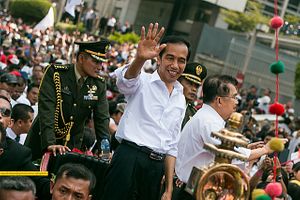On July 26, a stakeholder meeting was held involving the various actors working on Indonesia’s ongoing efforts to strengthen its defense industry. The engagement once again put the focus on the extent of progress on the objective advanced during the government of Joko “Jokowi” Widodo despite the significant challenges that remain for the Southeast Asian state in this realm.
As I have noted previously in these pages, in recent years, Indonesia has signaled its determination to build up the country’s domestic defense industry for a range of reasons, from boosting its self-sufficiency to contributing to the country’s economic prosperity. The effort begun to take off under the tenure of former President Susilo Bambang Yudhoyono, and it has continued under Indonesian President Joko “Jokowi” Widodo.
Jokowi had signaled a multi-pronged approach to achieving this since assuming office back in 2014, from the transfer of technology to improving the management of state-owned defense companies (See: “An Indonesian Defense Revolution Under Jokowi?”). But though some inroads have been made, significant challenges still remain.
Late last month, the progress with respect to defense industry collaboration was in the spotlight again in a meeting on the subject. A stakeholder meeting involving the various actors in Indonesia’s defense policy was held on July 26 at Indonesian military headquarters in Jakarta.
While the meeting featured broader discussions, there were also remarks delivered by the secretary general of the defense ministry, Hadiyan Sumintaatmadja. According to the defense ministry, in his remarks, Sumintaatmadja touched on the significant internal and external challenges that remained for the industry. These included several of those that Indonesian officials had already touched on before, including not just internal ones such as bottlenecks and a lack of public awareness on some aspects, but also external ones such as market prices and competition from other countries.
Sumintaatmadja also emphasized the importance of collaboration between the various actors involved to make the strengthening of the defense industry work more effectively. This included not just the government, whose involvement is critical, but also users such as the Indonesian military for which equipment was being built. The emphasis here was on a broader structural issue of ensuring coordination between what the key requirements are and what is being build in terms of areas of focus.
Indonesia’s goal of strengthening its defense industry is very much an ongoing process, with no shortage of challenges even as new opportunities continue to be pursued. The meeting late last month was yet another indication of how that ongoing process is evolving, and what policymakers are flagging as the key next steps for the country in this respect.

































